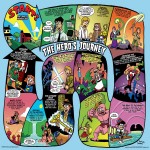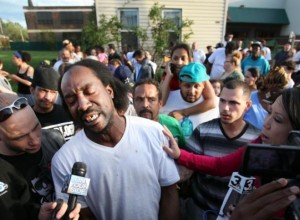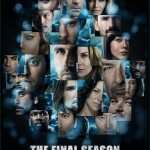 When you’ve seen as many movies as I have, you begin to see that they all follow a certain pattern. This is true not just of movies, but of all great stories ranging from those found in classic mythology and literature to modern TV series and video games. Joseph Campbell called it the monomyth or hero’s journey. It’s basically a series of steps that the protagonist must go through during the course of his or her adventure. In addition to this, there are also a number of spiritual principles that often find their way into storytelling. By combining these principles with the monomyth, you can pretty much figure out where just about any story is headed. While this skill has proven to be incredibly annoying to my wife, it’s come in very handy for me. Not because I’ve continually annoyed her with my usually correct movie and TV show predictions, but because I’ve noticed that these storytelling rules apply to more than just fictitious stories. They also apply to real life.
When you’ve seen as many movies as I have, you begin to see that they all follow a certain pattern. This is true not just of movies, but of all great stories ranging from those found in classic mythology and literature to modern TV series and video games. Joseph Campbell called it the monomyth or hero’s journey. It’s basically a series of steps that the protagonist must go through during the course of his or her adventure. In addition to this, there are also a number of spiritual principles that often find their way into storytelling. By combining these principles with the monomyth, you can pretty much figure out where just about any story is headed. While this skill has proven to be incredibly annoying to my wife, it’s come in very handy for me. Not because I’ve continually annoyed her with my usually correct movie and TV show predictions, but because I’ve noticed that these storytelling rules apply to more than just fictitious stories. They also apply to real life.
 You’ve seen it hundreds of times. Some guy is being interviewed by the local news after he helped prevent some crime or rescued someone in distress. The reporter asks, “Do you consider yourself a hero?” Apparently, this question must be asked in order to test whether or not said person is in fact a hero. According to local news rules of heroism, the man is only a hero, if and only if, he claims to not be one. Most people, knowing this rule, go on to say that they don’t consider themselves to be a hero because they just did what anyone in their situation would’ve done. The reporter then cuts back to the anchorpeople who disagree with the man’s assessment. Feeling that the hero test was passed, they comment about what a true hero the man is while a colorful “local hero” graphic displays besides them. Personally though, I agree with the guy. He’s not a hero.
You’ve seen it hundreds of times. Some guy is being interviewed by the local news after he helped prevent some crime or rescued someone in distress. The reporter asks, “Do you consider yourself a hero?” Apparently, this question must be asked in order to test whether or not said person is in fact a hero. According to local news rules of heroism, the man is only a hero, if and only if, he claims to not be one. Most people, knowing this rule, go on to say that they don’t consider themselves to be a hero because they just did what anyone in their situation would’ve done. The reporter then cuts back to the anchorpeople who disagree with the man’s assessment. Feeling that the hero test was passed, they comment about what a true hero the man is while a colorful “local hero” graphic displays besides them. Personally though, I agree with the guy. He’s not a hero.
 By now you have no doubt heard that according to astronomers and anthropologists, December 21, 2012 correlates to the “end” of the Mayan calendar. And, despite having repeatedly heard about this for many, many years now, it is also very probable that you still have no idea exactly what this means. The reason is because it’s very complicated. To even begin to understand it you need to look to the Mayan myths of the Sacred Tree and understand their incredibly complex Long Count calendar of tuns, k’atuns, and b’aktuns as well as their concepts of the Great Cycle, the Great Great Cycle, and cycles within cycles. You’d also need to understand astronomical occurrences involving the precession of the equinoxes and the conjunction of the sun at the intersection of the plane of the ecliptic and the Milky Way. You can do all that, or, you can simply read my interpretation of this summer’s Green Lantern movie, which shares the same message as the Mayan mythology.
By now you have no doubt heard that according to astronomers and anthropologists, December 21, 2012 correlates to the “end” of the Mayan calendar. And, despite having repeatedly heard about this for many, many years now, it is also very probable that you still have no idea exactly what this means. The reason is because it’s very complicated. To even begin to understand it you need to look to the Mayan myths of the Sacred Tree and understand their incredibly complex Long Count calendar of tuns, k’atuns, and b’aktuns as well as their concepts of the Great Cycle, the Great Great Cycle, and cycles within cycles. You’d also need to understand astronomical occurrences involving the precession of the equinoxes and the conjunction of the sun at the intersection of the plane of the ecliptic and the Milky Way. You can do all that, or, you can simply read my interpretation of this summer’s Green Lantern movie, which shares the same message as the Mayan mythology.
 In “Across the Sea,” Lost finally gives us the origins story for Jacob and the Man In Black. The episode was pure, 100% mythology. Those who watched the episode based on the surface story alone were probably disappointed. Let’s face it, taken literally, myths are silly: talking snakes, little boys defeating giants, jealous gods, immaculate conceptions, mortals with superpowers, a sword stuck in a stone, the Force, Never Never Land, Wonderland, Oz, the Matrix, the Island. On the surface, all myths seem like children’s stories. It’s only when we dig deeper that we find the truth worthy of a wise old soul—a soul that knows where it really came from.
In “Across the Sea,” Lost finally gives us the origins story for Jacob and the Man In Black. The episode was pure, 100% mythology. Those who watched the episode based on the surface story alone were probably disappointed. Let’s face it, taken literally, myths are silly: talking snakes, little boys defeating giants, jealous gods, immaculate conceptions, mortals with superpowers, a sword stuck in a stone, the Force, Never Never Land, Wonderland, Oz, the Matrix, the Island. On the surface, all myths seem like children’s stories. It’s only when we dig deeper that we find the truth worthy of a wise old soul—a soul that knows where it really came from.
 Wanna know why the Man In Black is really trapped on the island? It’s not because he’s malevolence, evil, or darkness, and it’s not because Jacob wouldn’t let him leave. It’s because he hasn’t overcome his issues. And what are his issues? Up to now, all we know is that he seems to be terribly frightened of adolescent boys. Hopefully, we’ll get a better answer next week, but as ridiculous as this might sound, I actually think there may be something to it.
Wanna know why the Man In Black is really trapped on the island? It’s not because he’s malevolence, evil, or darkness, and it’s not because Jacob wouldn’t let him leave. It’s because he hasn’t overcome his issues. And what are his issues? Up to now, all we know is that he seems to be terribly frightened of adolescent boys. Hopefully, we’ll get a better answer next week, but as ridiculous as this might sound, I actually think there may be something to it.
 For many of us, our lives don’t work out the way we planned. But that doesn’t mean that there isn’t a plan. It’s very apropos that Lost’s “Dr. Linus” episode was named for a teacher since it taught us some very valuable lessons about who we are and what our purpose here may be. In other words, it really was all about you.
For many of us, our lives don’t work out the way we planned. But that doesn’t mean that there isn’t a plan. It’s very apropos that Lost’s “Dr. Linus” episode was named for a teacher since it taught us some very valuable lessons about who we are and what our purpose here may be. In other words, it really was all about you.
 Whereas “Lighthouse” was all about our enlightenment, “Sundown” explored our dark side—temptation. “I can see her lying back in her satin dress in a room where you do what you don’t confess,” sang Gordon Lightfoot in his 1974 hit “Sundown.” The song is all about succumbing to temptation, hence once again revealing the double entendre that the Lost writers are so fond of using in their episode titles. When the sun goes down, man gets tempted by the dark. Why a “satin” dress? Sounds like Satan, don’t it?
Whereas “Lighthouse” was all about our enlightenment, “Sundown” explored our dark side—temptation. “I can see her lying back in her satin dress in a room where you do what you don’t confess,” sang Gordon Lightfoot in his 1974 hit “Sundown.” The song is all about succumbing to temptation, hence once again revealing the double entendre that the Lost writers are so fond of using in their episode titles. When the sun goes down, man gets tempted by the dark. Why a “satin” dress? Sounds like Satan, don’t it?
 Lost episode 6.4, “The Substitute,” has so many parallels with Willy Wonka and the Chocolate Factory , I am convinced that the movie can be used to reveal Lost’s endgame. While I’m sure those parallels also exist within the actual Charlie and the Chocolate Factory book, since I am more familiar with the 1971 Gene Wilder movie (having seen it dozens of times), I will make my comparisons there. Sure, this may turn out to be nothing more than stuff and nonsense, but in the words of Wonka, “a little nonsense now and then is relished by the wisest men.” So, let’s get to it because we have so much time and so little to do. Strike that…reverse it.
Lost episode 6.4, “The Substitute,” has so many parallels with Willy Wonka and the Chocolate Factory , I am convinced that the movie can be used to reveal Lost’s endgame. While I’m sure those parallels also exist within the actual Charlie and the Chocolate Factory book, since I am more familiar with the 1971 Gene Wilder movie (having seen it dozens of times), I will make my comparisons there. Sure, this may turn out to be nothing more than stuff and nonsense, but in the words of Wonka, “a little nonsense now and then is relished by the wisest men.” So, let’s get to it because we have so much time and so little to do. Strike that…reverse it.
 Have you ever met someone for the first time who seemed really familiar to you? Strangely, this person likely wound up being an important player in your life. This exact scenario happens to Jack in LA X when he recognizes Desmond on the plane. In What Kate Does, Kate’s parallel life is once again setting up the scene for her to have a connection with Claire and baby Aaron. What if the reason for this familiarity is because we are recognizing these people from our future, or from the story of our destiny?
Have you ever met someone for the first time who seemed really familiar to you? Strangely, this person likely wound up being an important player in your life. This exact scenario happens to Jack in LA X when he recognizes Desmond on the plane. In What Kate Does, Kate’s parallel life is once again setting up the scene for her to have a connection with Claire and baby Aaron. What if the reason for this familiarity is because we are recognizing these people from our future, or from the story of our destiny?
 As soon as I learned of the title of Lost’s Season 6 premiere episode last year, I immediately began to wonder about its implications. Sure, the LA X was a reference to LAX, the abbreviation for Los Angeles International Airport where Oceanic Flight 815 was suppose to land, but why was there a space between the “LA” and the “X”? Like everything on Lost, surely this play on letters was for a reason.
As soon as I learned of the title of Lost’s Season 6 premiere episode last year, I immediately began to wonder about its implications. Sure, the LA X was a reference to LAX, the abbreviation for Los Angeles International Airport where Oceanic Flight 815 was suppose to land, but why was there a space between the “LA” and the “X”? Like everything on Lost, surely this play on letters was for a reason.
 When you’ve seen as many movies as I have, you begin to see that they all follow a certain pattern. This is true not just of movies, but of all great stories ranging from those found in classic mythology and literature to modern TV series and video games. Joseph Campbell called it the monomyth or hero’s journey. It’s basically a series of steps that the protagonist must go through during the course of his or her adventure. In addition to this, there are also a number of spiritual principles that often find their way into storytelling. By combining these principles with the monomyth, you can pretty much figure out where just about any story is headed. While this skill has proven to be incredibly annoying to my wife, it’s come in very handy for me. Not because I’ve continually annoyed her with my usually correct movie and TV show predictions, but because I’ve noticed that these storytelling rules apply to more than just fictitious stories. They also apply to real life.
When you’ve seen as many movies as I have, you begin to see that they all follow a certain pattern. This is true not just of movies, but of all great stories ranging from those found in classic mythology and literature to modern TV series and video games. Joseph Campbell called it the monomyth or hero’s journey. It’s basically a series of steps that the protagonist must go through during the course of his or her adventure. In addition to this, there are also a number of spiritual principles that often find their way into storytelling. By combining these principles with the monomyth, you can pretty much figure out where just about any story is headed. While this skill has proven to be incredibly annoying to my wife, it’s come in very handy for me. Not because I’ve continually annoyed her with my usually correct movie and TV show predictions, but because I’ve noticed that these storytelling rules apply to more than just fictitious stories. They also apply to real life.










